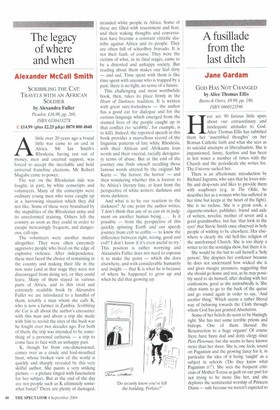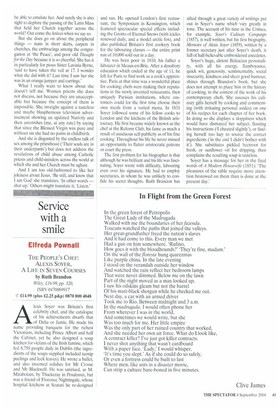A fusillade from the last ditch
Jane Gardam
GOD HAS NOT CHANGED by Alice Thomas Ellis Burns & Oates, £9.99, pp. 180, ISBN 0860123596 Here are 90 furious little spats about our extraordinary and inadequate attitudes to God. Alice Thomas Ellis has subtitled them her 'assembled thoughts' on her Roman Catholic faith and what she sees as its suicidal attempts at liberalisation. She is impassioned, funny, fearless and has been in hot water a number of times with the Church and the periodicals she writes for. The Universe sacked her.
There is an affectionate introduction by Richard Ingrams, who says that he loves misfits and drop-outs and likes to provide them with soapboxes (e.g. in The Oldie, he describes her as a woman who has suffered in her time but keeps at the heart of the fight). She is no recluse. She is a great cook, a cigarette-smoker, publisher, friend and aide of writers, novelist, mother of seven and a good grandmother, but has 'that look in the eyes' that Stevie Smith once observed in holy people of wishing to be elsewhere. Her elsewhere is clearly the old hell-fire religion of the unreformed Church. She is too sharp a writer to let the nostalgia show, but there it is.
She would be the last to call herself a 'holy person'. She despises her confessor because he does not understand how wicked she is and gives meagre penances, suggesting that she should go home and rest, as he may possibly need to do himself, after dealing with her confessions, good as she undoubtedly is. She often wants to go to the back of the queue and go round again in order to say, `And another thing.' Which seems a rather liberal way of behaving towards the Cloth through whom God has just granted Absolution.
Some of her beliefs do seem to be blazingly right. She has met some terrible priests and bishops. One of them likened the Resurrection to a huge orgasm! Of course there have been dud and dotty clergy since Piers Plowman, but she seems to have known more than her share. She is, one feels, sound on Paganism and the growing fancy for it, in particular the idea of it being `taught' as a subject in schools (`Do they know what Paganism is?'). She sees the frequent criticism of Mother Teresa as guilt on our part for not trying to be more like her, and she deplores the sentimental worship of Princess Diana — safe because we weren't expected to be able to emulate her. And surely she is also right to deplore the passing of the Latin Mass that held her Church together across the world? Out come the knives when we say so.
But she does go on about the peripheral things — nuns in short skirts, carpets in churches, the embracings among the congregation at 'the Peace', and poor old Thought for the Day because it is so cheerful. She has it in particularly for pious Sister Lavinia Byrne, 'said to have taken the veil at 17. I wonder what she did with it? Last time I saw her she was in an orange jumper and earrings.'
What I really want to know about she doesn't tell me. Women priests she does not discuss, not because they are unacceptable but because the concept of them is impossible. She inveighs against a tasteless and maybe blasphemous television advertisement showing an updated Nativity and then astonishes (me, at any rate) by saying that since the Blessed Virgin was pure and without sin she had no pains in childbirth.
And she is disgusted by the endless talk of sex among the priesthood (Their souls are in their underpants') but does not address the revelations of child abuse among Catholic priests and child-minders across the world at which she and her Church must be aghast.
And I am too old-fashioned to like her jokiness about Jesus. 'Be still, and know that I am God' she translates, 'In other words — shut up.' Others might translate it, 'Listen.'



































































 Previous page
Previous page